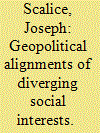| Srl | Item |
| 1 |
ID:
178627


|
|
|
|
|
| Summary/Abstract |
In April 1967, the Partido Komunista ng Pilipinas (PKP) broke in two. This article examines how a contradiction at the heart of the party’s program, which sought to retain leadership over both a mass movement and an alliance with a section of the elite, fragmented the party along the lines of the Sino-Soviet dispute. The ideological expression of the rival national interests of the Soviet Union and People’s Republic of China found congruent alignment with the diverging social forces in the PKP. The Soviet bureaucracy offered attractive terms of trade to countries of belated capitalist development. Sections of Filipino capitalists saw this as a means of developing national industry, and leading layers of the PKP allied themselves with the Marcos administration in support of these ends. In contrast, a cultural revolution and a protracted people’s war expressed the geopolitically imperiled position of China. University-based youth were drawn to this perspective. Over the course of 1966, the PKP was torn apart along the fault-lines of the Sino-Soviet ideological split, as this global dispute gave political form to the diverging social interests within the party.
|
|
|
|
|
|
|
|
|
|
|
|
|
|
|
|
| 2 |
ID:
171637


|
|
|
|
|
| Summary/Abstract |
This paper examines the systematization of Kazakh music in Mongolia during the Soviet era in Bayan-Ölgiy Province, focusing on the music collection and preservation activities led by a theater and radio station. Bayan-Ölgiy is located far from Ulaanbaatar; adjacent to Kazakhstan, Xinjiang (China), and Russia. Using three–years participation observation, this study identified three activities in promoting the systematization of Kazakh music in Mongolia: importing musical knowledge and technology from the Soviet Kazakh Republic (1950–1960s); establishing a radio station and audio archive following the Sino-Soviet split (1960s–1980s); collections of Kazakh music in Mongolia (1960s–1980s). These activities were driving forces for Kazakhs to claim their identity in the post-socialist period in Mongolia. Diener found that Kazakh culture in Mongolia was preserved thanks to the geographic isolation of Bayan-Ölgiy. However, this study clearly identifies international relations and Bayan-Ölgiy’s strategic location as drivers of systematization of Kazakh music in Mongolia.
|
|
|
|
|
|
|
|
|
|
|
|
|
|
|
|